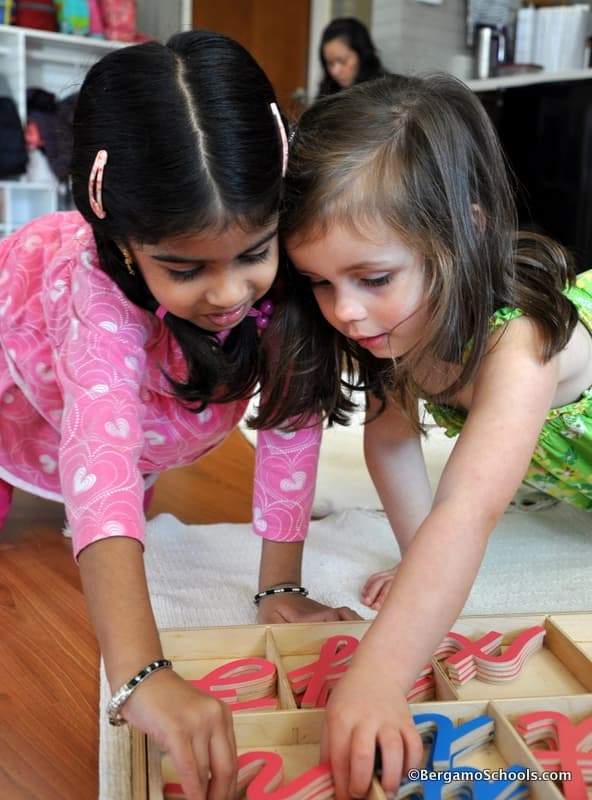It’s that time of year…
Schools and parents alike are planning for next school year. If your child has been in a Montessori class for a year or two, you may be thinking ahead to kindergarten. Many public schools offer kindergarten, and most parents are curious about this transitional year.
Montessori Primary classrooms are multi-age environments that follow a three-year cycle, starting at age three and ending at six. For most parents, it is intuitively obvious how their young child benefits from the arrangement.
The three-year-old children have the benefit of older students as role models for behavior in addition to the adults in the environment. They are surrounded by opportunities to observe older children doing more advanced work which inspires them to explore more challenging concepts when they are ready. And when they stumble, or forget a classroom procedure, or encounter an obstacle they cannot overcome, there are older helping hands to graciously assist.
But, what do the older five and six-year-old children get out of staying in Montessori? Although not as intuitively obvious, the benefits of keeping your child in Montessori for “Kindergarten” are even more compelling – and will have profound effects on your child’s social, emotional, and academic development.
Consider the following:
Learning Without Limits
It is in the third year that all of the academic preparation of the first two years comes to fruition. The work they did with the numbers 1 through 10, the teens and tens, and then the categories of the decimal system through 9,999 only come to a full expression in the third year.
They count the squares and cubes of numbers, move toward an abstraction of the processes of addition, subtraction, multiplication and division, and memorize math facts.
The seeds we plant for literacy with our three and four-year olds – as they began building phonetic words with the cut-out letters of the moveable alphabet – open the entire world of reading, writing, and grammar to them in their third year.
As they learn phonograms (2-letter combinations) and non-phonetic “sight” words they round out the mechanics of reading. Their writing moves beyond words to phrases and then sentences, and ultimately to stories and their first reports. They begin to develop reading comprehension and lay the groundwork for creative expression through work with the parts of speech, exploring the functions of the article, adjective, noun, verb, adverb, conjunction, and preposition.
Although children would eventually work with the decimal system, learn to read and write, and recognize the parts of speech at some point in a conventional school, it probably wouldn’t be for several years. But, they are ready for it now.
What a waste to make them wait for years, by which time their interest is blunted and the context of two years of careful preparation is lost. It’s as if they had spent two years preparing a sumptuous feast but have to wait for years before they satisfy their hunger.
And, let’s not forget that most conventional Kindergarten programs offer a half day program for a child’s first experience in school. Most – if not all – of the concepts have already been introduced and mastered by your child in her previous two years in Montessori.
In our 43 years of experience, we notice that most children who transition out of Montessori for a conventional Kindergarten are uninspired and somewhat bored. Is that what you want your child’s first experience in Elementary school to be?
Leadership, Confidence and Community
But all of these academic gains pale in significance to the personality development that comes together in the third year. When they were three and four, they counted on the five-year-olds to show the way and to help overcome obstacles. Now the three and four year-olds look to them!
Even the teacher relies on them to set the standard and to help the younger ones out of respect for their competence and accomplishment. They not only have the opportunity to develop empathy for the younger, newer, and less capable students, but to act on that empathy in a positive and responsible way. Third year students literally carry themselves differently, with the sense of self-esteem and self- assurance that comes with being the leaders of the class.
Third year students still do practical life exercises, but less for the sake of the process as when they were three or four. Now they do them for the good of the group, taking pride in the health of the plants and animals, the beauty and cleanliness of their classroom environment. They gain a profound sense of accomplishment by applying these skills to the benefit of all.
Montessori Kindergarten – A Once in a Lifetime Experience
This feeling of self-confidence, self-worth, and responsibility is perhaps the greatest benefit and accomplishment of the third year. This explains why a teacher looks so stricken when one of her students leaves too soon, for she knows better than anyone what a remarkable experience they will be missing.
– Pam Lynn, Founder
